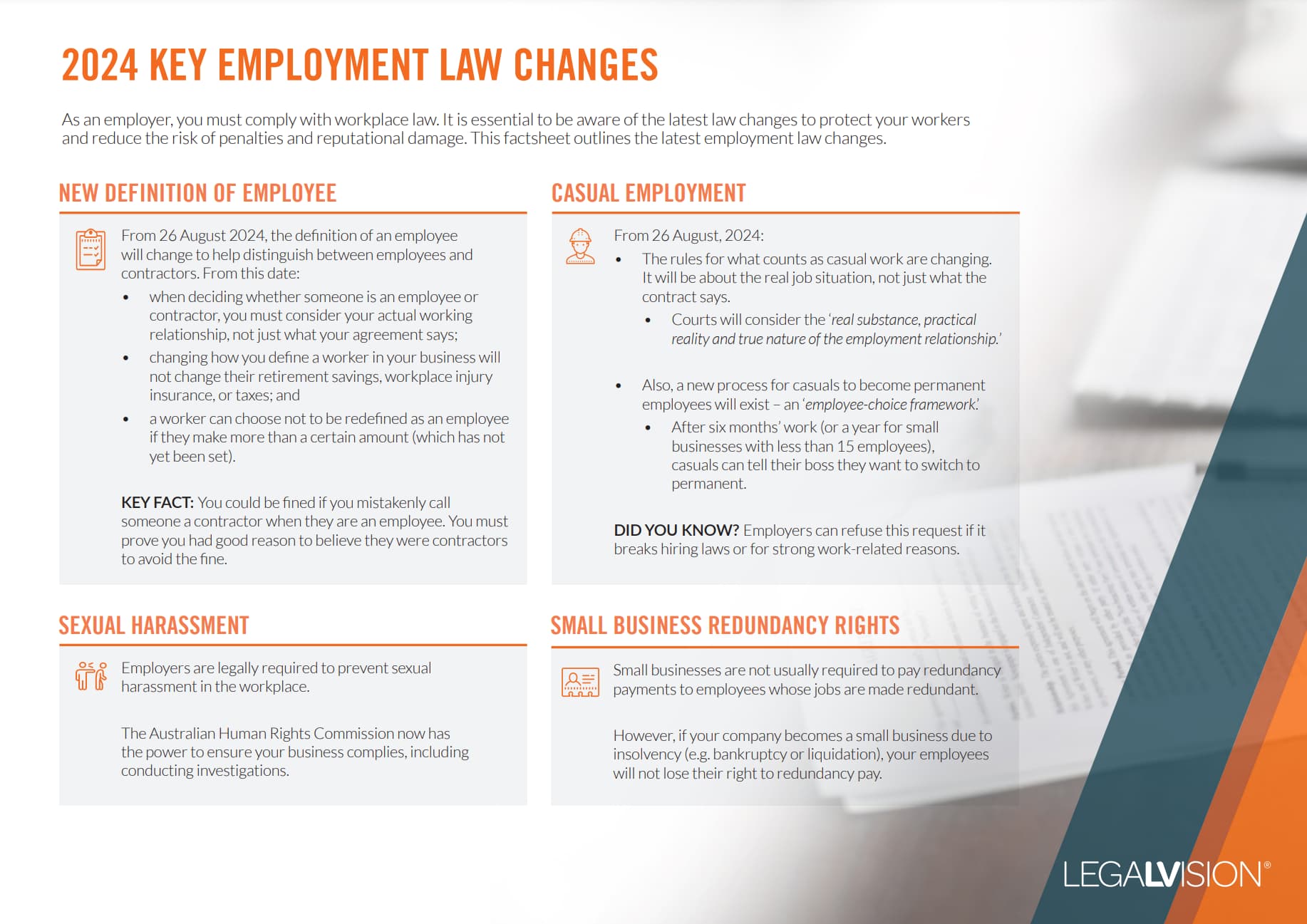In Short
- Casual employees can request permanent employment after 12 months.
- Employers must provide casual employees with a conversion offer after 12 months, subject to eligibility.
- You may refuse a conversion request if reasonable business grounds exist.
Tips for Businesses
Review your casual employees’ eligibility for permanent conversion regularly. Make sure you understand the criteria and reasonable grounds for refusing a request. Clear communication with employees about their rights and your decision-making process will help you stay compliant and avoid potential disputes.
As per the upcoming changes to casual employment laws, the conversion process will be significantly altered. Currently, as an employer, it is your duty to assess the casual employment relationship after 12 months and offer permanent employment to eligible casual employees. However, starting on August 26th, 2024, the employees will initiate the process. They will have to give notice to their employer after completing six months of continuous employment, or 12 months for small businesses, to switch to permanent employment.
What are the Changes?
The key changes resulting from the Bill are:
- a new statutory definition of a ‘casual employee’ in the FW Act; and
- processes for employees to seek casual conversion.
Definition of ‘Casual Employee’
The Fair Work Act 2009 (‘the Act’) is set to introduce a new definition of ‘casual employee’ to replace the existing one. Under the new definition, an employee will still only be classified as a casual only if there is no firm advance commitment to continuing and indefinite work, taking into account the practical reality and true nature of the employment relationship.
There are several factors to consider when determining whether an employee is classified as a casual employee. These factors include:
- the actual nature of the employment, including the practical reality of the work being performed;
- the mutual understanding between the employer and the employee, whether it is outlined in a contract or not;
- your inability to offer consistent work to the employee;
- the employee’s ability to accept or reject work as it is offered;
- the likelihood of the business having work available in the future;
- whether there are full-time or part-time employees performing the same duties; and
- whether the employee has a regular pattern of work.
These considerations can help you determine whether an employee is a casual employee and, therefore, entitled to certain benefits and protections under the law.
The changes will also introduce new regulations prohibiting companies from dismissing or threatening to dismiss employees to engage them as casuals. Furthermore, there will be rules against making certain misrepresentations regarding casual employment.

As an employer, it is essential to understand what employment laws have changed and their implications for your business — particularly the changes to the Fair Work Act 2009 through the new Closing the Loopholes legislation.
Casual Conversion
The recent amendment to the Act allows a casual employee to seek casual conversion by providing written notification to their employer. Employees can issue this notification only after completing a minimum of six months of employment with their employer.
You are required to respond within 21 days of receiving this notification. The response must:
- be in writing; and
- clearly state whether you accept or reject the request.
If you accept a casual conversion request, it is important to inform the employee of several key details. First, specify whether their status will change to full-time or part-time. Then, provide details about their new working hours and confirm the date the change takes effect. Ensure this information is communicated clearly to avoid any confusion.
Under the Act, if a dispute arises regarding the employee’s status, you should first attempt to resolve it at the workplace level. If this fails, either party can refer the matter to the Fair Work Commission.
Key Takeaways
If you have a casual workforce, you should take the following steps to ensure compliance with the new provisions of the Act:
- ensure you have processes for issuing the Casual Employment Information Statement to both new and existing employees from August 26th;
- update your casual employment contracts; and
- review your casual workforce to determine which casual employees are eligible for casual conversion.
If you have questions about casual conversion, our experienced employment lawyers can assist as part of our LegalVision membership. For a low monthly fee, you will have unlimited access to lawyers to answer your questions and draft and review your documents. Call us today on 1300 544 755 or visit our membership page.
Frequently Asked Questions
Casual employment is irregular ad-hoc employment where there is no ongoing expectation of work. The employment starts and ends at the start and end of each engagement.
Permanent employees can be part-time or full-time. They have regular and systematic employment with an ongoing expectation of work. The parties agree to a minimum number of hours each week and the hours are generally worked on the same days.
Eligible employees must make a request in writing. Whether they request to convert to full-time or part-time will depend on whether they have worked equivalent full-time or part-time hours over the past 12 (or six) months.
We appreciate your feedback – your submission has been successfully received.











